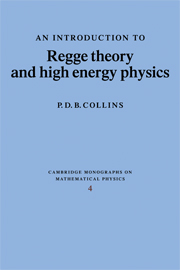Book contents
- Frontmatter
- Contents
- Preface
- 1 The scattering matrix
- 2 The complex angular-momentum plane
- 3 Some models containing Regge poles
- 4 Spin
- 5 Regge trajectories and resonances
- 6 Introduction
- 7 Duality
- 8 Regge cuts
- 9 Multi-Regge theory
- 10 Inclusive processes
- 11 Regge models for many-particle cross-sections
- 12 Regge poles, elementary particles and weak interactions
- Appendix A The Legendre functions
- Appendix B The rotation functions
- References
- Index
9 - Multi-Regge theory
Published online by Cambridge University Press: 07 October 2011
- Frontmatter
- Contents
- Preface
- 1 The scattering matrix
- 2 The complex angular-momentum plane
- 3 Some models containing Regge poles
- 4 Spin
- 5 Regge trajectories and resonances
- 6 Introduction
- 7 Duality
- 8 Regge cuts
- 9 Multi-Regge theory
- 10 Inclusive processes
- 11 Regge models for many-particle cross-sections
- 12 Regge poles, elementary particles and weak interactions
- Appendix A The Legendre functions
- Appendix B The rotation functions
- References
- Index
Summary
Introduction
So far we have limited our attention to four-particle scattering amplitudes (i.e. to processes of the form l + 2 → 3 + 4). These have the advantage of being kinematically rather similar to the potential-scattering amplitudes, for which the basic ideas of Regge theory were originally developed. In particular they depend on only two independent variables, s and t, and so it is a fairly straightforward matter to make analytic continuations in J and t. Also there is a wealth of two-body-final-state data with which to compare the predictions of the theory.
Though the initial state of any physical scattering process will always in practice be a two-particle state (counting bound states such as deuterons as single particles), except at very low energies particle production is always likely to occur. And as the energy increases twobody and quasi-two-body final states make up a diminishing fraction of all the events. So it is very desirable to be able to extend our understanding of Regge theory so as to obtain predictions for many-body final states. Theoretically, this is even more necessary, since models like fig. 3.3 for Regge poles or fig. 8.6 for Regge cuts demonstrate how even in 2 → 2 amplitudes Regge theory makes essential use of manybody unitarity. So if we are to have any hope of making Regge theory self-consistent (in the bootstrap sense, for example) we must be able to describe such intermediate states in terms of Regge singularities.
- Type
- Chapter
- Information
- An Introduction to Regge Theory and High Energy Physics , pp. 291 - 319Publisher: Cambridge University PressPrint publication year: 1977



